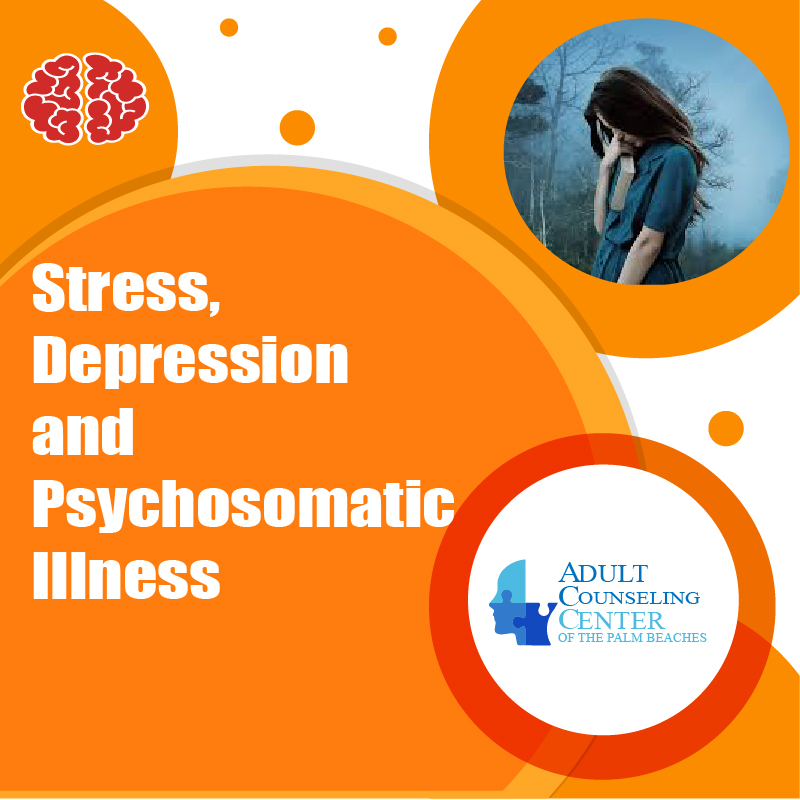
The term psychosomatic refers to real physical symptoms that arise from the mind and are influenced by emotions rather than a specific organic cause in the body (such as an injury or infection).
A psychosomatic illness originates from emotional stress and manifests in the body as physical pain and other symptoms. Depression can contribute to psychosomatic illness, especially when the body’s immune system has been weakened by severe and/or chronic stress.
A common misconception is that psychosomatic conditions are imaginary or “all in the head.” In reality, physical symptoms of psychosomatic conditions are real and need treatment just as any other illness would.
Unfortunately, this does not always happen in a timely or effective manner. The pervasive social stigma attached to psychosomatic illness may prevent someone from seeking treatment.

Even when someone does seek treatment, stigma is also present in research and medical communities, at least in part because the mechanisms that drive the stress-illness relationship are not yet fully understood.
Symptoms
You may not have thought much about the unique ways stress manifests physically, but it can be helpful to learn how to recognize when you are under extreme stress. Once you identify the signs, you can work on reducing the effect stress has on your health.
While it sounds like a complicated undertaking, there are actually some simple ways you can determine if you are stressed out.
Try this exercise: take both your hands and touch your neck. If your hands feel significantly colder than your neck, it is a sign you are under stress. If they are warm, you are relaxed.
Other common physical signs of stress include:
- Racing heart
- Sweaty palms
- Tense muscles
- “Butterflies” in the stomach
Bodily signs of stress may be different depending on if you are biologically male or female.
For example, women often report symptoms such as fatigue despite getting enough sleep, irritability, abdominal bloating, and changes to their menstrual periods.
Signs and symptoms of stress in men are more likely to include chest pain, increased blood pressure, and changes in sex drive.
Symptoms of stress also vary by age. Children often display stress through their body because they haven’t yet developed the language they need to communicate how they feel. For example, a child who is having a hard time at school may have frequent stomach aches and may be sent home or ask to stay home.
Stress in the teen years can be especially intense, particularly during periods of major social adjustment and hormonal shifts. Sometimes, signs of stress in people in this age group may be missed or attributed to “teen angst” when it is really a sign of adolescent depression.
The elderly are also prone to depression, as they are often contending with several compounding factors, such as isolation, loss and grief, and chronic or serious health problems. If you are caring for an aging loved one, make sure you know the signs of depression in older adults.
Causes
There are actually different kinds of stress, some of which can be positive. Eustress is what makes life invigorating and interesting. It’s a feeling that makes you want to get up in the morning and keeps you motivated.
If you’ve ever enjoyed the thrill of a roller coaster ride or felt a sense of excitement and fulfillment when completing a project, you’ve experienced “good” stress.
On the other hand, if you’ve ever experienced a major loss, gone through a big life change, or endured other stressors, you also know what “bad” stress feels like.
Just like you can feel the giddiness and uplifting feelings of good stress all over, the negative effects of bad stress can be felt in your mind and your body.
Compare your body to a pressure cooker. If it’s allowed to vent its steam, it works efficiently. If it can’t vent steam, the pressure continues to build until the lid blows off.
Now, imagine that the cooker is under pressure already and you apply more pressure to keep the lid on. When the container can no longer hold in all the pressure, it will break at its weakest point.
Like the pressure cooker giving way at the weakest point of its structure, stress-related illness is most likely to develop where your body is already weakened.
Someone who is under stress and not able to “vent” their emotions or who tries to “keep it all in” will eventually reach an emotional breaking point. It may manifest as a bout of situational depression or trigger an episode of major depression.
In retrospect, you may realize there were some warning signs or “clues” that such a break was coming—especially in terms of the physical symptoms you experience.
For example, if your neck has always been your physical weakness, you may find your pain increases when you are stressed. Back pain, stomach trouble, and headaches are other common ways stress may take up residence in your body.
How Stress Can Make You Sick
Stress can also compromise your immunity. Some people find that when they are stressed, they’re more likely to catch a cold or the flu. They may also get more infections or take longer to get better.
One way researchers think stress causes physical symptoms and illness is through the release of certain chemicals in the body, including cortisol and adrenaline, which can lead to inflammation.
These chemicals are an important part of the body’s “fight or flight” response to stress and can be very useful. However, if the body has high amounts or they are released continuously over an extended period of time, these chemicals may do more harm than good.
Leave a reply










Leave a reply